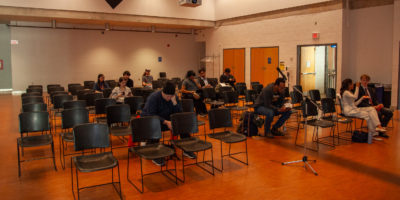By Pooja Rambaran
Ryerson’s international students are facing increased financial burdens as their tuition costs have not changed, despite the fall semester’s curriculum taking place primarily online.
First-year student Sarah Hamdan switched from Ryerson to State University of New York at Buffalo for its chemical engineering program after failing to receive adequate financial assistance from Ryerson and being unable to secure a Canadian study permit.
“I learned of how difficult it may be for me to find a job in Toronto due to COVID-19,” said Hamdan. She’d found part-time work in the U.S. as a cashier after being laid off from her job as a swim coach. However, she makes less and is at higher risk of catching the coronavirus in her new position. She additionally hasn’t been paid hazard pay since June and received only one U.S. stimulus cheque.
“I understand Ryerson feels they cannot afford to cut their tuition, but as an international student who is not even allowed to step foot into the country I would be studying in, I do not believe the expensive tuition is justifiable.”
Had Hamdan continued with her enrolment into Ryerson, she would’ve had to pay for all university and living expenses with limited aid from her family.
“I do believe the teachers deserve their regular salary, as well as any staff still working. But the school’s ultimate decision to not make…even [a] small cut to the tuition is a painful reminder that university is a business before it thinks about providing education,” said Hamdan.
Ryerson has no plans to change their international tuition fees. In an emailed statement to The Eyeopener, the university said its regular expenses have not changed due to the pandemic.
“Virtual instruction requires the same number of instructors and student support staff and requires additional resources to support rapidly changing pedagogical and technological needs,” the statement read.
The university stated that it has incurred almost $10 million in additional costs responding to the challenges of the COVID-19 pandemic, with more investments expected in the upcoming year.
International students contributed nearly $22 billion to the Canadian economy in 2018, through accommodation, living expenses and hefty tuition costs which are three times the domestic fee.
“The school’s ultimate decision…is a painful reminder that university is a business before it thinks about providing education”
Third-year language and intercultural relations student Shalani* said she travelled back home to Barbados in a haze of uncertainty after the World Health Organization declared COVID-19 a pandemic on March 11.
Since her parents are her sole providers, Shalani said it was more financially viable for her to stay in Barbados.
International students could not apply for the Canadian Emergency Student Benefit (CESB) or Canada Student Service Grant (CSSG) provided by the federal government.
They can apply for the Canadian Emergency Response Benefit (CERB) of $2,000 every four weeks for about six months. However, they’re required to have stopped working due to COVID-19 and must have earned at least $5,000 in the 12 months prior to the date of their application.
Shalani did not qualify for CERB and, additionally, failed to receive relief from Ryerson, since the resources she came across required her to have been enrolled into fall classes. Because she had outstanding fees, she was unable to enrol in time to receive funds.
Between connectivity issues, insufficient communication with peers and professors and a distracting home environment, Shalani said she was unable to see the value of online classes. Now she has deferred her fall semester and hopes to return to school in the winter semester.
The university has made efforts to provide funding to students during the pandemic through several faculty and department-specific relief funds, including the Ryerson Relief Fund, which distributed $3 million among 4,000 students. However, only $353,250 of this fund was specifically disbursed to international students, according to an emailed statement from Ryerson.
“While there was no predetermined cap to the number of international students who could receive these supports, funds were [disbursed] based on availability and need,” the statement read.
The International Student Support (ISS) emergency bursary and other bursaries offered by ISS provided over $121,000 for international students.
Although raises in tuition for domestic students have been frozen since the pandemic, “international fees have been reviewed on a program by program basis and in some instances have been increased to remain in line with peer institutions,” the Ryerson statement continued.
“[The fees] should be reduced because I don’t have to use the gym [and] I don’t have to use the school facilities”
Ryerson has set up a COVID-19 FAQ page and sends bi-weekly emails to all international students to inform them of resources available as well as changes implemented by Immigration, Refugees & Citizenship Canada (IRCC) on their status in Canada.
However, third-year language and intercultural relations student Siobhan Alexis, from Trinidad and Tobago, found herself disconnected from the university’s efforts to help students and actively sought out Ryerson’s resources on social media. She was able to access the Faculty of Arts COVID-19 student emergency fund, which provided between $200 and $1,000 to students.
As a math and English tutor, Alexis considers herself lucky that her job transitioned online and she was able to continue working.
“I’m glad I still have my job but also back in Trinidad, it’s just a little more difficult for my parents to keep up with their jobs because hours are now cut,” Alexis said. “It’s just harder to send money from Trinidad to Canada to pay off my fees.”
“The whole point of coming to Canada was to attend school and since I can’t physically attend school, [the fees] should be reduced because I don’t have to use the gym [and] I don’t have to use the school facilities,” Alexis added.
Hamdan said that Ryerson, as well as other universities that made similar decisions regarding tuition costs, need to realize that there is a great amount of international students as part of their communities whose access to resources are put under more stress in the current financial crises.
“These universities could really be helping their student body more, but they choose not to.”
*Surname has been omitted to protect source’s privacy.










Leave a Reply